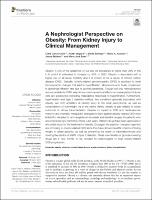| dc.contributor | Vall d'Hebron Barcelona Hospital Campus |
| dc.contributor.author | Vergara Arana, Ander |
| dc.contributor.author | Bermejo Garcia, Sheila |
| dc.contributor.author | Azancot Rivero, M Antonieta |
| dc.contributor.author | Sellarés Roig, Joana |
| dc.contributor.author | Soler Romeo, Maria Jose |
| dc.contributor.author | García-Carro, Clara |
| dc.date.accessioned | 2021-12-07T12:31:35Z |
| dc.date.available | 2021-12-07T12:31:35Z |
| dc.date.issued | 2021-04 |
| dc.identifier.citation | García-Carro C, Vergara A, Bermejo S, Azancot MA, Sellarés J, Soler MJ. A Nephrologist Perspective on Obesity: From Kidney Injury to Clinical Management. Front Med. 2021 Apr;8:655871. |
| dc.identifier.issn | 2296-858X |
| dc.identifier.uri | https://hdl.handle.net/11351/6658 |
| dc.description | Chronic kidney disease; Obesity; Kidney transplantation |
| dc.description.abstract | Obesity is one of the epidemics of our era. Its prevalence is higher than 30% in the U.S. and it is estimated to increase by 50% in 2030. Obesity is associated with a higher risk of all-cause mortality and it is known to be a cause of chronic kidney disease (CKD). Typically, obesity-related glomerulopathy (ORG) is ascribed to renal hemodynamic changes that lead to hyperfiltration, albuminuria and, finally, impairment in glomerular filtration rate due to glomerulosclerosis. Though not only hemodynamics are responsible for ORG: adipokines could cause local effects on mesangial and tubular cells and podocytes promoting maladaptive responses to hyperfiltration. Furthermore, hypertension and type 2 diabetes mellitus, two conditions generally associated with obesity, are both amplifiers of obesity injury in the renal parenchyma, as well as complications of overweight. As in the native kidney, obesity is also related to worse outcomes in kidney transplantation. Despite its impact in CKD and cardiovascular morbility and mortality, therapeutic strategies to fight against obesity-related CKD were limited for decades to renin-angiotensin blockade and bariatric surgery for patients who accomplished very restrictive criteria. Last years, different drugs have been approved or are under study for the treatment of obesity. Glucagon-like peptide-1 receptor agonists are promising in obesity-related CKD since they have shown benefits in terms of losing weight in obese patients, as well as preventing the onset of macroalbuminuria and slowing the decline of eGFR in type 2 diabetes. These new families of glucose-lowering drugs are a new frontier to be crossed by nephrologists to stop obesity-related CKD progression. |
| dc.language.iso | eng |
| dc.publisher | Frontiers Media |
| dc.relation.ispartofseries | Frontiers in Medicine;8 |
| dc.rights | Attribution 4.0 International |
| dc.rights.uri | http://creativecommons.org/licenses/by/4.0/ |
| dc.source | Scientia |
| dc.subject | Obesitat - Tractament |
| dc.subject | Ronyons - Malalties - Complicacions |
| dc.subject.mesh | Obesity |
| dc.subject.mesh | /drug therapy |
| dc.subject.mesh | Kidney Diseases |
| dc.subject.mesh | /complications |
| dc.title | A Nephrologist Perspective on Obesity: From Kidney Injury to Clinical Management |
| dc.type | info:eu-repo/semantics/article |
| dc.identifier.doi | 10.3389/fmed.2021.655871 |
| dc.subject.decs | obesidad |
| dc.subject.decs | /farmacoterapia |
| dc.subject.decs | enfermedades renales |
| dc.subject.decs | /complicaciones |
| dc.relation.publishversion | https://doi.org/10.3389/fmed.2021.655871 |
| dc.type.version | info:eu-repo/semantics/publishedVersion |
| dc.audience | Professionals |
| dc.contributor.organismes | Institut Català de la Salut |
| dc.contributor.authoraffiliation | [García-Carro C] Nephrology Department, San Carlos Clinical University Hospital, Madrid, Spain. [Vergara A, Bermejo S, Azancot MA, Sellarés J, Soler MJ] Servei de Nefrologia, Vall d'Hebron Hospital Universitari, Barcelona, Spain. Grup de Recerca en Nefrologia, Vall d'Hebron Institut de Recerca (VHIR), Barcelona, Spain |
| dc.identifier.pmid | 33928108 |
| dc.identifier.wos | 000644170000001 |
| dc.rights.accessrights | info:eu-repo/semantics/openAccess |

